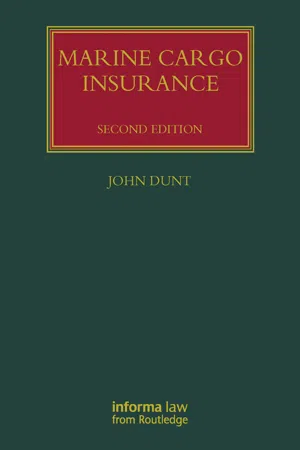
- 616 pages
- English
- ePUB (mobile friendly)
- Available on iOS & Android
Marine Cargo Insurance
About this book
The new edition of this British Insurance Law Association (BILA)-award winning text is the definitive reference source for marine cargo insurance law.
Written by an author who was closely involved with the revisions to the Institute Cargo Clauses 2009, the work expertly examines marine cargo insurance by reference to important English and foreign legal cases as well as the Marine Insurance Act 1906. Logically arranged to reflect the structure of the Institute Cargo Clauses, the most widely used standard form of cover, this text offers easy to find solutions for today's busy practitioner.
New to this edition:
-
- Completely revised to include the Insurance Act 2015 (duty of fair presentation; warranties, fraudulent claims)
-
- Brand new chapter on the revised Institute Ancillary and Trade Clauses, including those to be introduced on 1 November 2015
-
- Increased coverage of jurisdiction and choice of law, particularly taking into account the Rome I Regulation
-
- Enhanced coverage of the issue of Constructive Total Loss
-
- Consideration of the Law Reform Commission's proposals for the reform of insurance law, and further amendments to the Marine Insurance Act 1906.
-
- Covers latest developments in the Enterprise Bill for damages for late payment of claims
-
- Fully updated with all of the influential cases since 2009, including:
-
- The Cendor MOPU, one of the most important marine insurance cases of the last 50 years.
-
- Clothing Management v Beazley Solutions
-
- Notable hull cases such as Versloot Dredging v HDI Gerling on fraudulent devices
-
- Influential foreign cases taken from this book's sister text, International Cargo Insurance
This unique text is a one-stop resource for marine insurance lawyers handling cargo claims, and will also be of interest to students and researchers of maritime law.
Frequently asked questions
- Essential is ideal for learners and professionals who enjoy exploring a wide range of subjects. Access the Essential Library with 800,000+ trusted titles and best-sellers across business, personal growth, and the humanities. Includes unlimited reading time and Standard Read Aloud voice.
- Complete: Perfect for advanced learners and researchers needing full, unrestricted access. Unlock 1.4M+ books across hundreds of subjects, including academic and specialized titles. The Complete Plan also includes advanced features like Premium Read Aloud and Research Assistant.
Please note we cannot support devices running on iOS 13 and Android 7 or earlier. Learn more about using the app.
Information
1 History and definition of marine cargo insurance
Historical background
The London market
Origins of marine cargo insurance
The development of Lloyd's and insurance companies
Table of contents
- Cover Page
- Half Title Page
- Series
- Title Page
- Copyright Page
- Dedication
- Outline Contents
- Contents
- Preface to the second edition
- Abbreviations
- Table of cases
- Table of legislation
- Table of Institute and other clauses
- 1 History and definition of marine cargo insurance
- 2 Law and jurisdiction clauses
- 3 Open covers, policies and certificates of insurance
- 4 Insurable interest and the indemnity principle
- 5 Good faith, non-disclosure, misrepresentation and the duty of fair presentation
- 6 Warranties, conditions and exclusions
- 7 Causation
- 8 All risks and exclusions
- 9 Named perils cover and insurance for specific trades, commodities and transits
- 10 War, strikes, terrorism and rejection risks
- 11 Duration of the insurance 1 The transit clause
- 12 Duration of the insurance 2 Termination of carriage and change of voyage
- 13 Claims and losses
- 14 Recoverable expenses and liabilities Sue and labour, salvage, general average and collision liabilities
- 15 Measure of indemnity
- 16 Subrogation, double insurance and rights of contribution
- 1 Marine Insurance Act 1906 411
- 2 Public Order Act 1986 (Sections 1 and 10(2)) 439
- 3 Reinsurance (Acts of Terrorism) Act 1993 441
- 4 Third Parties (Rights against Insurers) Act 2010 443
- 5 Insurance Act 2015 463
- 6 Market Reform Contract for marine cargo insurance (based on Willis Proforma) 481
- 7 Lloyd’s Marine Policy: MAR91 489
- 8 Certifi cate of Insurance 493
- 9 Subrogation Form 495
- 10 Institute Cargo Clauses (All Risks) 1/1/63 497
- 11 Institute Cargo Clauses (A) 1/1/82 501
- 12 Institute Cargo Clauses (A) 1/1/09 505
- 13 Institute Cargo Clauses (B) 1/1/09 511
- 14 Institute Cargo Clauses (C) 1/1/09 517
- 15 Institute War Clauses (Cargo) 1/1/09 523
- 16 Institute Strikes Clauses (Cargo) 1/1/09 529
- 17 Institute Cargo Clauses (Air) (excluding sendings by Post) 1/1/09 533
- 18 Institute War Clauses (Air Cargo) (excluding sendings by Post) 1/1/09 539
- 19 Institute Strikes Clauses (Air Cargo) 1/1/09 543
- 20 Institute War Clauses (sendings by Post) 1/3/09 547
- 21 Institute Bulk Oil Clauses 551
- 22 Institute Coal Clauses 557
- 23 Institute Timber Trade Federation Clauses 561
- 24 Institute Jute Clauses 566
- 25 Institute Natural Rubber Clauses
- 26 Institute Malicious Damage Clause 1/8/82 577
- 27 Institute Theft, Pilferage and Non-Delivery Clause 1/12/82 579
- 28 Institute Replacement Clause 01/12/2008 581
- 29 Institute Classifi cation Clause 01/01/2001 583
- 30 Institute Extended Radioactive Contamination Exclusion Clause 01/11/2002 585
- 31 Institute Radioactive Contamination, Chemical, Biological, Bio-chemical and Electromagnetic Weapons Exclusion Clause 10/11/2003 587
- 32 Institute Cyber Attack Exclusion Clause 10/11/03 589
- 33 Termination of Transit Clause (Terrorism) 2009 JC2009/056 591
- 34 Insolvency Exclusion Clause JC93 593
- 35 Contracts (Rights of Third Parties) Act 1999 Exclusion Clause (Cargo) JC2000/002 595
- 36 Cargo Piracy Notice of Cancellation JC2008/024
- Index